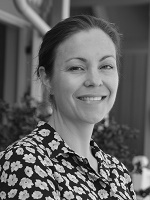Due to copyright issues, an electronic copy of the thesis must be ordered from the faculty. For the faculty to have time to process the order, the order must be received by the faculty at the latest 2 days before the public defence. Orders received later than 2 days before the defence will not be processed. After the public defence, please address any inquiries regarding the thesis to the candidate.
Trial Lecture – time and place
See Trial Lecture.
Adjudication committee
- First opponent: Professor Boel Andersson Gäre, University of Jönköping, Sweden
- Second opponent: Associate Professor II Tordis Sørensen Høifødt, UiT - The Arctic University of Norway, Norway
- Third member and chair of the evaluation committee: Professor II Anders Christofer Lundqvist, Faculty of Medicine, University of Oslo
Chair of the Defence
Professor Bjørn Morten Hofmann, University of Oslo
Principal Supervisor
Senior researcher Karin Isaksson Rø, LEFO - Institute for Studies of the Medical Profession
Summary
The thesis explores the short- and long-term experiences of doctors after participating in a peer support program. The research is situated within the broader context of doctor well-being which is of importance both for the doctors and for patient care.
Research questions: The study addresses the reasons doctors seek peer support, the influence of peer support on subsequent changes in their attitudes and behaviors, and the impact of various elements in the design of peer support services on their perceived benefits. The research aims to understand doctors´ reflections and experiences, emphasizing the changes needed to promote doctor well-being.
Methodology and data: Two Norwegian peer support services for doctors, Villa Sana and Støttekollegaordningen, were investigated through in-depth, semi-structured interviews with doctors within 10 days and a year after they had utilized these services. The data was collected and analyzed over a period of three years. One of the approaches was comparing short-term with the long-term follow-up interviews to assess changes. The results were interpreted in light of three different theoretical perspectives; 1) Edgar Schein’s theory on organizational culture, 2) psychological safety and 3) the hidden curriculum in medicine.
Key conclusions and findings: Reasons for seeking peer support: The doctors reported a broad spectrum of reasons for seeking support, spanning from concerns and seeking advice, feeling unable to cope any longer, to having been on sick leave and now looking for a way back to work or a way out. They described both work- and privately related reasons for seeking support.
Influence of peer support on change processes a year later: The study indicated a shift in the doctors’ expectations of what it means to be a doctor to also embrace and accept more human aspects, such as illness, limitations, and self-worth beyond work performance. They thereby challenge unwritten rules known as the ‘hidden curriculum’ in medicine dictating that doctors should be strong, healthy, and always put the patient´s needs first. The doctors reported having made changes both in relation to work and in their private relationships. Some had attended therapy and treatment. It thus seems that peer support can facilitate awareness of and promote changes in professional cultural values that help the doctors to self-care.
Impact of design elements on benefit from peer support: The design elements of peer support services, including psychological safety and informal settings, played a significant role in doctors' perceived benefits of the services. It was emphasized as crucial that the arrangement provided a meeting between equals and not a doctor-patient encounter. Peer support facilitated reflection and questioning of assumptions in the medical culture, contributing to increased awareness of and changes in professional values that facilitated self-care. The confidential and non-record-keeping nature of the services were crucial in encouraging help-seeking.
The thesis contributes to discussions on doctor health and highlights the importance of effective support mechanisms. It underscores the need for awareness within the medical community regarding professional norms that may hinder self-care, advocating for reflection on addressing these issues in daily practice. It raises the question whether it is not only the doctors but also the doctors’ workplaces that need to change.
Additional information
Contact the research support staff.
